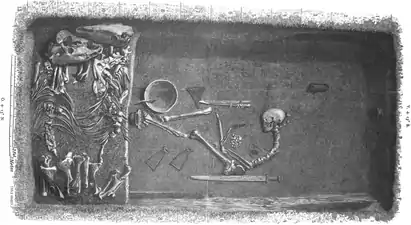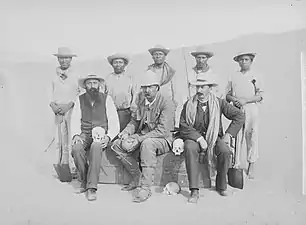Hjalmar Stolpe
Knut Hjalmar Stolpe (23 April 1841 – 27 January 1905), was a Swedish entomologist, archaeologist, and ethnographer.[1] He was the first director and curator of the Museum of Ethnography, Sweden. He is best known for his meticulous archaeological excavations at the Viking-age site Birka on the island Björkö.[2][3]
Hjalmar Stolpe | |
|---|---|
 | |
| Born | 23 April 1841 Gävle, Sweden |
| Died | 27 January 1905 (aged 63) Stockholm, Sweden |
| Resting place | Solna cemetery |
| Nationality | Swedish |
| Alma mater | Uppsala University |
| Scientific career | |
| Fields | Entomology, archeology, ethnography |
Biography
Hjalmar Stolpe was born at Gävle in Gävleborg County, Sweden. He was the son of Carl Johan Stolpe, the mayor of Norrköping, and Katarina Vilhelmina Charlotta Eckhoff.
He graduated from Uppsala University in 1860 with a degree in zoology and botany and obtained a PhD in 1872. He worked at the Swedish History Museum during the years 1874–1900. Over a period of twenty years, he carried out large excavations at Birka on Björkö where there are burial mounds dating from the Bronze Age. One of the graves he documented was that of the Birka female Viking warrior (Birka chamber grave Bj 581) buried with the accoutrements of an elite professional Viking warrior in a 10th-century chamber-grave.[4] [5]
In 1883–1885 he took part in the Vanadis expedition which sailed around the world with the frigate Vanadis visiting South America, Oceania, Asia, and Europe. During land excursions, Stolpe collected 7500 cultural specimens for an intended ethnographical museum in Sweden. In 1900, an ethnographic department was established at Swedish Museum of Natural History (now the Museum of Ethnography, Sweden (Etnografiska museet). Hjalmar Stolpe became the ethnographic unit's first director. In 1903 he was appointed curator and professor. [6]
Personal life
From 1875 he was married to Emmy Holmgren (1841 - 1905). He died during 1905 at Stockholm.
Gallery
 Sketch from Stolpe's diary about Birka in 1875
Sketch from Stolpe's diary about Birka in 1875 Sketch from his diary published in 1889 about the Bj 581 gravesite
Sketch from his diary published in 1889 about the Bj 581 gravesite Hjalmar Stolpe during the Vanadise Expedition at Ancón, Peru, 1884
Hjalmar Stolpe during the Vanadise Expedition at Ancón, Peru, 1884
Publications
- Stolpe, Hjalmar & Arne, Ture Algot Johnsson (1912). Graffältet vid Vendel (original, Swedish ed.). Stockholm, SE: K.L. Beckmans Boktryckeri.CS1 maint: ref=harv (link)

- Stolpe, Hjalmar & Arne, Ture Algot Johnsson (1927). La Nécropole De Vendel (French trans. ed.). Stockholm, SE: Akademiens Förlag.CS1 maint: ref=harv (link) (French edition of Stolpe & Arne 1912)
References
- Culin, Stewart (1906). "Hjalmar Stolpe" (PDF). American Anthropologist. 8: 150–156. doi:10.1525/aa.1906.8.1.02a00160.
- Hedenstierna-Jonson; et al. (2017). "A female Viking warrior confirmed by genomics". American Journal of Physical Anthropology. 164 (4): 853–860. doi:10.1002/ajpa.23308. PMC 5724682. PMID 28884802.
- Koffmar, Linda (8 September 2017). "Första DNA-bevisen för kvinnlig vikingakrigare" [First DNA evidence for female Viking warriors] (Press release) (in Northern Sami). Uppsala, Sweden: Uppsala University. Archived from the original on 17 September 2017.
- Erikson, Bo G. (2015). Kungen av Birka: Hjalmar Stolpe arkeolog och etnograf: en biografi. ISBN 978-91-7353-764-3.
- "Secrets of The Dead: Viking Warrior Queen". PBS Video. Retrieved 1 September 2020.
- "Vanadis-samlingen från skilda världsdelar införskaffades av Hjalmar Stolpe". Etnografiska Museet. Retrieved 1 September 2020.
Other sources
Related reading
- Harrison, Dick; Kristina Svensson (2007) Vikingaliv (Stockholm : Natur och Kultur) ISBN 9789127152762